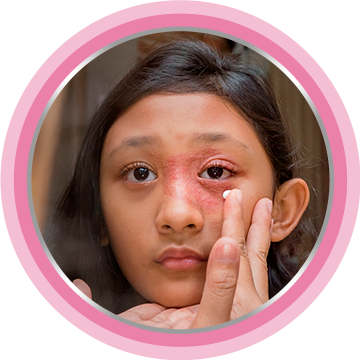
Skin care regime
As you’re certainly aware, dry skin is one of the main symptoms of eczema. When your skin is dry, the skin barrier isn’t as strong which means that you lose moisture more quickly, and are more prone to inflammation and infections.3 Therefore, moisturizing your skin is a key eczema treatment.
Emollients, a family of moisturizing treatments that help reduce water loss and protect the skin, can be used multiple times a day (follow the manufacturer’s or your healthcare professional’s recommendations) to help keep your skin moisturized, ideally right after washing when the skin is moist. There are many different types of emollients, from soap replacements to ointments, and they can contain a range of active ingredients. You may find that you prefer a routine with different emollients at different times in the day, e.g. a heavier ointment in the evening and a lighter cream in the day.

Makeup
- If you wear makeup regularly, you’ll likely notice that many different products can aggravate your eczema rather than helping to cover it up. It may take some trial and error to find the products that are best for you as preferences well vary from person-to-person, but here are some things to watch out for. It’s recommended to always test a product for any reaction or skin allergy before you apply it regularly.
- Try to stick to makeup that’s hypoallergenic, noncomedogenic, nonacnegenic and designed for sensitive skin.
- Fragrances often cause irritation, look for products that are fragrance-free rather than unscented as unscented products may still contain fragrances.
- Many people react to preservatives in products.
- Remember to dispose of your makeup according to the manufacturer’s recommendations – eye makeup in particular should be replaced every three to four months as eyes are particularly sensitive.
- Using water based or water soluble makeup makes it easier to remove your makeup at the end of the day and therefore less irritating for your skin.
- Make sure you always wash your hands before applying makeup, and wash your makeup brushes regularly.

Eczema on baby skin
Affecting up to 20% of children globally, eczema is one of the most common skin conditions.3 In babies, eczema is most likely to occur on the face or scalp, aggravated by factors such as drooling, heat in the summer or the cold in winter, skin allergies, or contact with irritants like soaps or some fabrics. Many of the same recommendations that apply to adults apply to babies with eczema, including regular bathing in warm water, and application of moisturizers or emollients.5 However, as baby skin is particularly delicate, we recommend visiting a healthcare professional who can recommend the best steps to take for you and your baby.
You can use Bepanthen Itch Relief Cream at the first sign of eczema. Bepanthen Itch Relief Cream is a steroid-free cream that helps relieve itching and redness in as fast as 30 minutes while promoting skin barrier restoration. If symptoms persist, consult your doctor.








